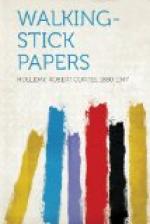You are doing pretty well. Many of us, just somebodies but nobodies in especial particular, do not have a separate head at all but go in a group into the feature “Obituary Notes.” Our names are set in “caps,” and we have a brisk paragraph apiece, admirable pieces of composition, pellucid, compact, nervous. Our stories are contained in these dry-point-like portraits stript of all that was occasional, accidental, ephemeral, leaving alone the essential facts, such as, for instance, that we were, say, a civil engineer. I think it would be well for each of us occasionally to visualise his obituary “note.” This should have the effect of clarifying our outlook. Amid the welter of existence what is it that we are above all to do? To thine own self be true. You are a husband, a father, and a civil engineer. That is all that matters in the end.
But after all, all obituaries in a great city are for the elect. The great majority of us have none at all, in print. What we were is, indeed, graven on the hearts that knew us, and told in the places where we have been. But in the written word we go into the feature headed “Died,” a department similar in design to that on the literary page headed “Books Received.” We are arranged alphabetically according to the first letter of our surnames. We are set in small type with lines following the name line indented. It is difficult for me to tell with certainty from the printed page but I think we are set without leads. Here again, frequently, the reader comes upon the breath of affection, the hand of some one near to the one that is gone: “Beloved husband of ------.” And he is touched by the realisation that even in the rushing city, somewhere unseen amid the hard glitter and the gay scene, to-day warm hearts are torn, and that simple grief throbs in and makes perennially poignant a bromidian phrase.
As this column lengthens the paragraphs shorten, until is reached what seems to me the most moving obituary of all, that most eloquent of the destiny of men. “ROE. ------ Richard. 1272 West 96th St., Dec. 30, aged 54.” It is like to the most moving line, perhaps, in modern literature. For nowhere else, I think, is there one of such simplicity and grandeur as this from “The Old Wives’ Tale”: “He had once been young, and he had grown old, and was now dead.”
XXI
A TOWN CONSTITUTIONAL
There is certainly no more grotesque fallacy than that humorously bigoted notion so generally entertained, particularly by our friends of other nations (at any rate, before the war), that the only thing in the world for which we as a people care is success as measured by money. A walk about any day will give this ridiculous idea a black eye. Any one with ears to his head will perceive that we scorn things which are to be had for money. Money! What is that? Phew! Everybody has it. It




